Court Report: Heidi's Case - Social Work Perspective & Ethical Review
VerifiedAdded on 2023/06/14
|7
|2301
|263
Report
AI Summary
This document presents a social work report prepared for court, focusing on the case of Heidi, a young parent struggling with substance abuse issues. The report details Heidi's background, including her involvement with heroin, her participation in a methadone program, and her challenges as a parent. It covers her social background, education, work experience, drug history, health, and financial situation. The report assesses Heidi's behavior and recommends actions, such as community service for theft. A reflection on ethical considerations, social justice, and human rights issues relevant to the case is also included. The report emphasizes the importance of considering Heidi's rights and providing support for her recovery, highlighting the ethical dilemmas and the need for social justice in her case. References to relevant academic literature are provided to support the analysis and recommendations.

Social Work Report to Court
Heidi
Heidi
Paraphrase This Document
Need a fresh take? Get an instant paraphrase of this document with our AI Paraphraser
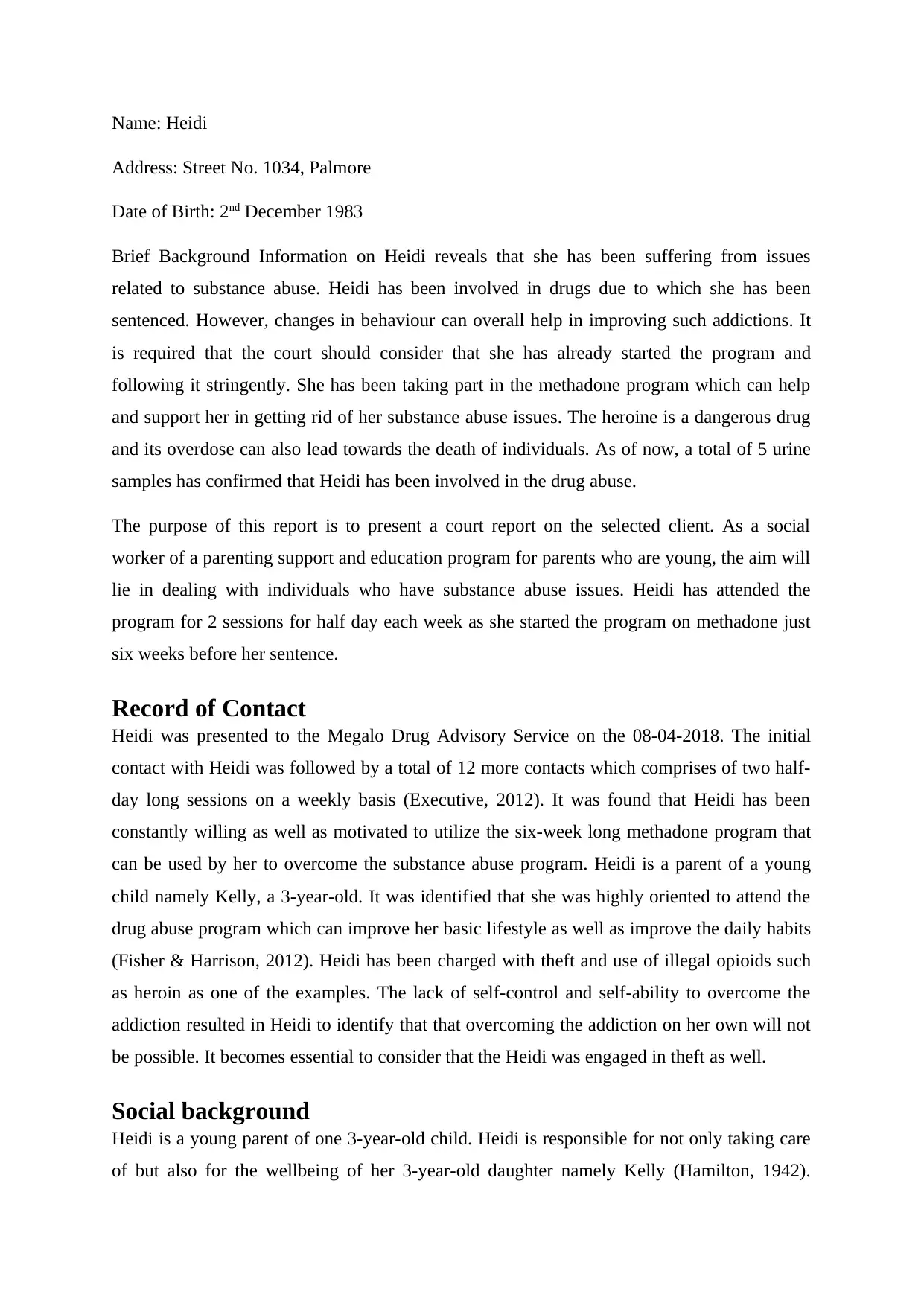
Name: Heidi
Address: Street No. 1034, Palmore
Date of Birth: 2nd December 1983
Brief Background Information on Heidi reveals that she has been suffering from issues
related to substance abuse. Heidi has been involved in drugs due to which she has been
sentenced. However, changes in behaviour can overall help in improving such addictions. It
is required that the court should consider that she has already started the program and
following it stringently. She has been taking part in the methadone program which can help
and support her in getting rid of her substance abuse issues. The heroine is a dangerous drug
and its overdose can also lead towards the death of individuals. As of now, a total of 5 urine
samples has confirmed that Heidi has been involved in the drug abuse.
The purpose of this report is to present a court report on the selected client. As a social
worker of a parenting support and education program for parents who are young, the aim will
lie in dealing with individuals who have substance abuse issues. Heidi has attended the
program for 2 sessions for half day each week as she started the program on methadone just
six weeks before her sentence.
Record of Contact
Heidi was presented to the Megalo Drug Advisory Service on the 08-04-2018. The initial
contact with Heidi was followed by a total of 12 more contacts which comprises of two half-
day long sessions on a weekly basis (Executive, 2012). It was found that Heidi has been
constantly willing as well as motivated to utilize the six-week long methadone program that
can be used by her to overcome the substance abuse program. Heidi is a parent of a young
child namely Kelly, a 3-year-old. It was identified that she was highly oriented to attend the
drug abuse program which can improve her basic lifestyle as well as improve the daily habits
(Fisher & Harrison, 2012). Heidi has been charged with theft and use of illegal opioids such
as heroin as one of the examples. The lack of self-control and self-ability to overcome the
addiction resulted in Heidi to identify that that overcoming the addiction on her own will not
be possible. It becomes essential to consider that the Heidi was engaged in theft as well.
Social background
Heidi is a young parent of one 3-year-old child. Heidi is responsible for not only taking care
of but also for the wellbeing of her 3-year-old daughter namely Kelly (Hamilton, 1942).
Address: Street No. 1034, Palmore
Date of Birth: 2nd December 1983
Brief Background Information on Heidi reveals that she has been suffering from issues
related to substance abuse. Heidi has been involved in drugs due to which she has been
sentenced. However, changes in behaviour can overall help in improving such addictions. It
is required that the court should consider that she has already started the program and
following it stringently. She has been taking part in the methadone program which can help
and support her in getting rid of her substance abuse issues. The heroine is a dangerous drug
and its overdose can also lead towards the death of individuals. As of now, a total of 5 urine
samples has confirmed that Heidi has been involved in the drug abuse.
The purpose of this report is to present a court report on the selected client. As a social
worker of a parenting support and education program for parents who are young, the aim will
lie in dealing with individuals who have substance abuse issues. Heidi has attended the
program for 2 sessions for half day each week as she started the program on methadone just
six weeks before her sentence.
Record of Contact
Heidi was presented to the Megalo Drug Advisory Service on the 08-04-2018. The initial
contact with Heidi was followed by a total of 12 more contacts which comprises of two half-
day long sessions on a weekly basis (Executive, 2012). It was found that Heidi has been
constantly willing as well as motivated to utilize the six-week long methadone program that
can be used by her to overcome the substance abuse program. Heidi is a parent of a young
child namely Kelly, a 3-year-old. It was identified that she was highly oriented to attend the
drug abuse program which can improve her basic lifestyle as well as improve the daily habits
(Fisher & Harrison, 2012). Heidi has been charged with theft and use of illegal opioids such
as heroin as one of the examples. The lack of self-control and self-ability to overcome the
addiction resulted in Heidi to identify that that overcoming the addiction on her own will not
be possible. It becomes essential to consider that the Heidi was engaged in theft as well.
Social background
Heidi is a young parent of one 3-year-old child. Heidi is responsible for not only taking care
of but also for the wellbeing of her 3-year-old daughter namely Kelly (Hamilton, 1942).
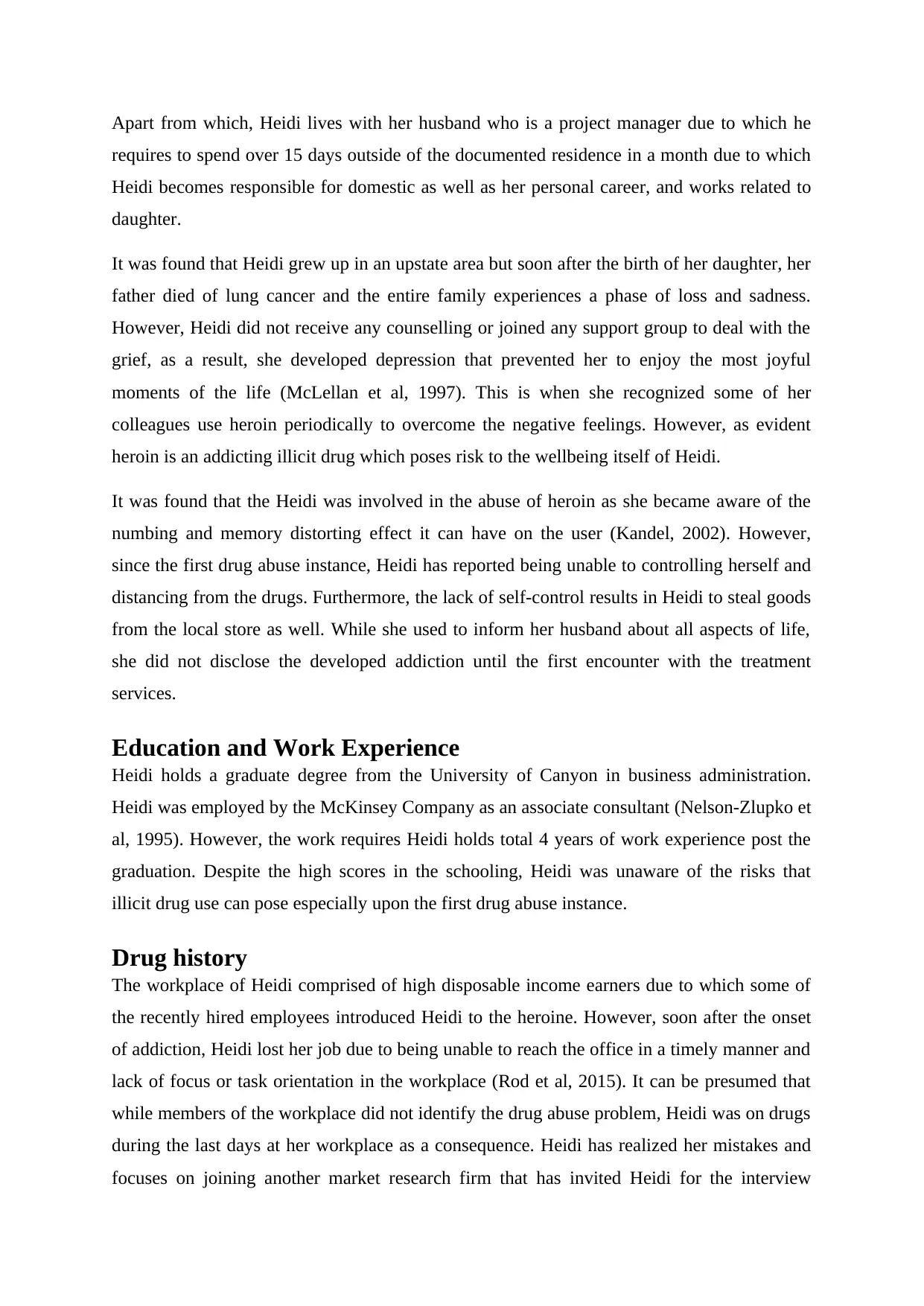
Apart from which, Heidi lives with her husband who is a project manager due to which he
requires to spend over 15 days outside of the documented residence in a month due to which
Heidi becomes responsible for domestic as well as her personal career, and works related to
daughter.
It was found that Heidi grew up in an upstate area but soon after the birth of her daughter, her
father died of lung cancer and the entire family experiences a phase of loss and sadness.
However, Heidi did not receive any counselling or joined any support group to deal with the
grief, as a result, she developed depression that prevented her to enjoy the most joyful
moments of the life (McLellan et al, 1997). This is when she recognized some of her
colleagues use heroin periodically to overcome the negative feelings. However, as evident
heroin is an addicting illicit drug which poses risk to the wellbeing itself of Heidi.
It was found that the Heidi was involved in the abuse of heroin as she became aware of the
numbing and memory distorting effect it can have on the user (Kandel, 2002). However,
since the first drug abuse instance, Heidi has reported being unable to controlling herself and
distancing from the drugs. Furthermore, the lack of self-control results in Heidi to steal goods
from the local store as well. While she used to inform her husband about all aspects of life,
she did not disclose the developed addiction until the first encounter with the treatment
services.
Education and Work Experience
Heidi holds a graduate degree from the University of Canyon in business administration.
Heidi was employed by the McKinsey Company as an associate consultant (Nelson-Zlupko et
al, 1995). However, the work requires Heidi holds total 4 years of work experience post the
graduation. Despite the high scores in the schooling, Heidi was unaware of the risks that
illicit drug use can pose especially upon the first drug abuse instance.
Drug history
The workplace of Heidi comprised of high disposable income earners due to which some of
the recently hired employees introduced Heidi to the heroine. However, soon after the onset
of addiction, Heidi lost her job due to being unable to reach the office in a timely manner and
lack of focus or task orientation in the workplace (Rod et al, 2015). It can be presumed that
while members of the workplace did not identify the drug abuse problem, Heidi was on drugs
during the last days at her workplace as a consequence. Heidi has realized her mistakes and
focuses on joining another market research firm that has invited Heidi for the interview
requires to spend over 15 days outside of the documented residence in a month due to which
Heidi becomes responsible for domestic as well as her personal career, and works related to
daughter.
It was found that Heidi grew up in an upstate area but soon after the birth of her daughter, her
father died of lung cancer and the entire family experiences a phase of loss and sadness.
However, Heidi did not receive any counselling or joined any support group to deal with the
grief, as a result, she developed depression that prevented her to enjoy the most joyful
moments of the life (McLellan et al, 1997). This is when she recognized some of her
colleagues use heroin periodically to overcome the negative feelings. However, as evident
heroin is an addicting illicit drug which poses risk to the wellbeing itself of Heidi.
It was found that the Heidi was involved in the abuse of heroin as she became aware of the
numbing and memory distorting effect it can have on the user (Kandel, 2002). However,
since the first drug abuse instance, Heidi has reported being unable to controlling herself and
distancing from the drugs. Furthermore, the lack of self-control results in Heidi to steal goods
from the local store as well. While she used to inform her husband about all aspects of life,
she did not disclose the developed addiction until the first encounter with the treatment
services.
Education and Work Experience
Heidi holds a graduate degree from the University of Canyon in business administration.
Heidi was employed by the McKinsey Company as an associate consultant (Nelson-Zlupko et
al, 1995). However, the work requires Heidi holds total 4 years of work experience post the
graduation. Despite the high scores in the schooling, Heidi was unaware of the risks that
illicit drug use can pose especially upon the first drug abuse instance.
Drug history
The workplace of Heidi comprised of high disposable income earners due to which some of
the recently hired employees introduced Heidi to the heroine. However, soon after the onset
of addiction, Heidi lost her job due to being unable to reach the office in a timely manner and
lack of focus or task orientation in the workplace (Rod et al, 2015). It can be presumed that
while members of the workplace did not identify the drug abuse problem, Heidi was on drugs
during the last days at her workplace as a consequence. Heidi has realized her mistakes and
focuses on joining another market research firm that has invited Heidi for the interview
⊘ This is a preview!⊘
Do you want full access?
Subscribe today to unlock all pages.

Trusted by 1+ million students worldwide
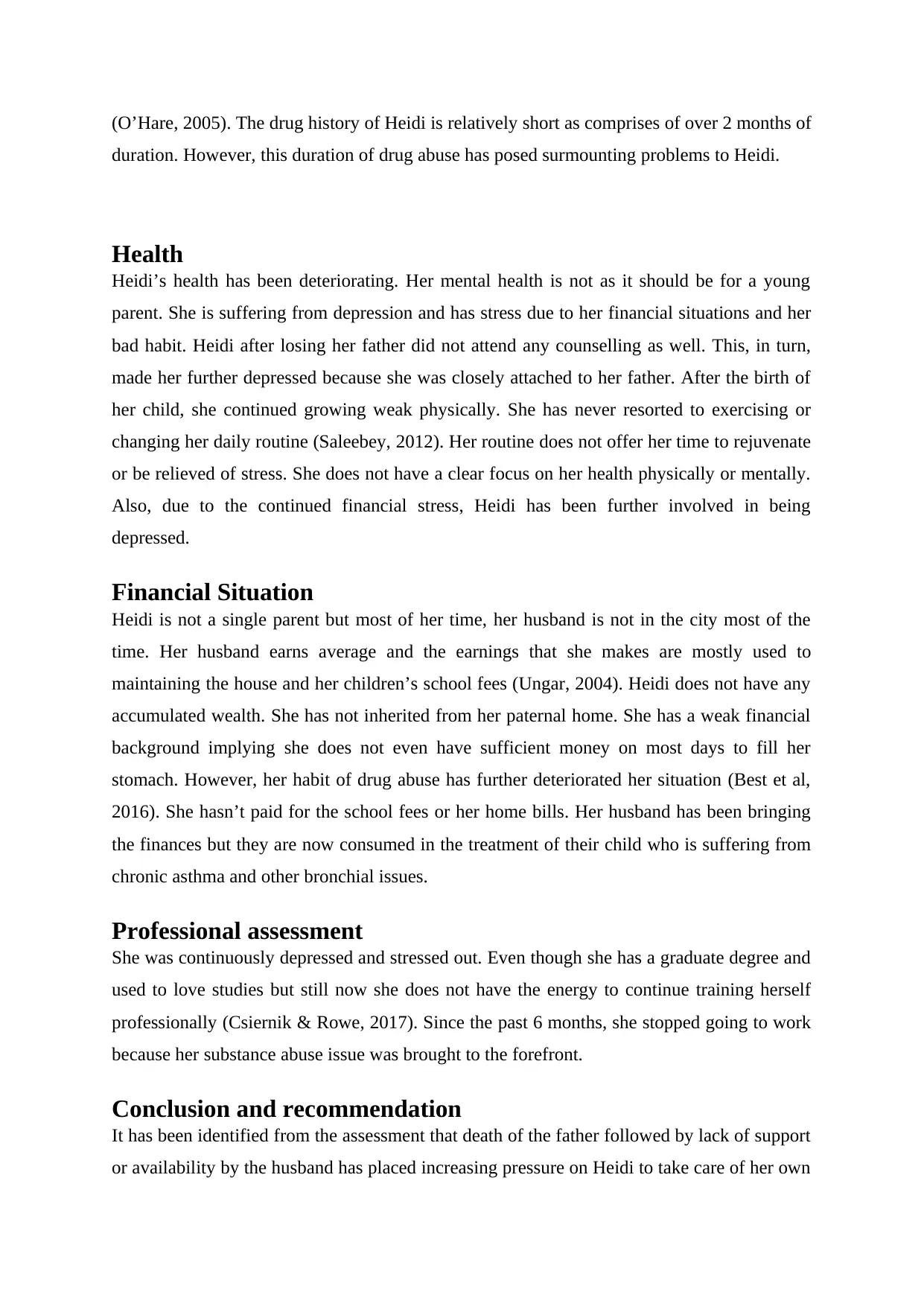
(O’Hare, 2005). The drug history of Heidi is relatively short as comprises of over 2 months of
duration. However, this duration of drug abuse has posed surmounting problems to Heidi.
Health
Heidi’s health has been deteriorating. Her mental health is not as it should be for a young
parent. She is suffering from depression and has stress due to her financial situations and her
bad habit. Heidi after losing her father did not attend any counselling as well. This, in turn,
made her further depressed because she was closely attached to her father. After the birth of
her child, she continued growing weak physically. She has never resorted to exercising or
changing her daily routine (Saleebey, 2012). Her routine does not offer her time to rejuvenate
or be relieved of stress. She does not have a clear focus on her health physically or mentally.
Also, due to the continued financial stress, Heidi has been further involved in being
depressed.
Financial Situation
Heidi is not a single parent but most of her time, her husband is not in the city most of the
time. Her husband earns average and the earnings that she makes are mostly used to
maintaining the house and her children’s school fees (Ungar, 2004). Heidi does not have any
accumulated wealth. She has not inherited from her paternal home. She has a weak financial
background implying she does not even have sufficient money on most days to fill her
stomach. However, her habit of drug abuse has further deteriorated her situation (Best et al,
2016). She hasn’t paid for the school fees or her home bills. Her husband has been bringing
the finances but they are now consumed in the treatment of their child who is suffering from
chronic asthma and other bronchial issues.
Professional assessment
She was continuously depressed and stressed out. Even though she has a graduate degree and
used to love studies but still now she does not have the energy to continue training herself
professionally (Csiernik & Rowe, 2017). Since the past 6 months, she stopped going to work
because her substance abuse issue was brought to the forefront.
Conclusion and recommendation
It has been identified from the assessment that death of the father followed by lack of support
or availability by the husband has placed increasing pressure on Heidi to take care of her own
duration. However, this duration of drug abuse has posed surmounting problems to Heidi.
Health
Heidi’s health has been deteriorating. Her mental health is not as it should be for a young
parent. She is suffering from depression and has stress due to her financial situations and her
bad habit. Heidi after losing her father did not attend any counselling as well. This, in turn,
made her further depressed because she was closely attached to her father. After the birth of
her child, she continued growing weak physically. She has never resorted to exercising or
changing her daily routine (Saleebey, 2012). Her routine does not offer her time to rejuvenate
or be relieved of stress. She does not have a clear focus on her health physically or mentally.
Also, due to the continued financial stress, Heidi has been further involved in being
depressed.
Financial Situation
Heidi is not a single parent but most of her time, her husband is not in the city most of the
time. Her husband earns average and the earnings that she makes are mostly used to
maintaining the house and her children’s school fees (Ungar, 2004). Heidi does not have any
accumulated wealth. She has not inherited from her paternal home. She has a weak financial
background implying she does not even have sufficient money on most days to fill her
stomach. However, her habit of drug abuse has further deteriorated her situation (Best et al,
2016). She hasn’t paid for the school fees or her home bills. Her husband has been bringing
the finances but they are now consumed in the treatment of their child who is suffering from
chronic asthma and other bronchial issues.
Professional assessment
She was continuously depressed and stressed out. Even though she has a graduate degree and
used to love studies but still now she does not have the energy to continue training herself
professionally (Csiernik & Rowe, 2017). Since the past 6 months, she stopped going to work
because her substance abuse issue was brought to the forefront.
Conclusion and recommendation
It has been identified from the assessment that death of the father followed by lack of support
or availability by the husband has placed increasing pressure on Heidi to take care of her own
Paraphrase This Document
Need a fresh take? Get an instant paraphrase of this document with our AI Paraphraser
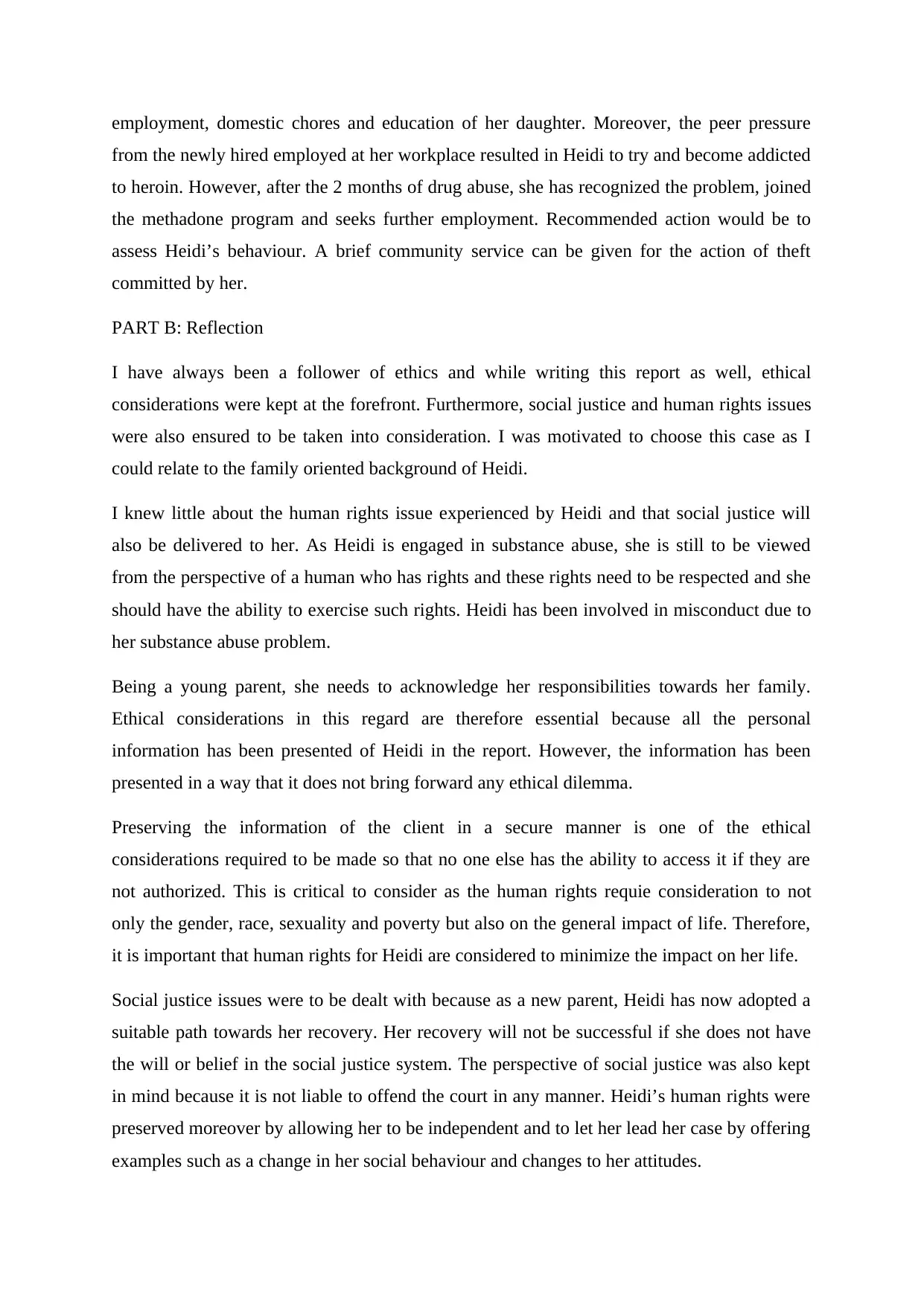
employment, domestic chores and education of her daughter. Moreover, the peer pressure
from the newly hired employed at her workplace resulted in Heidi to try and become addicted
to heroin. However, after the 2 months of drug abuse, she has recognized the problem, joined
the methadone program and seeks further employment. Recommended action would be to
assess Heidi’s behaviour. A brief community service can be given for the action of theft
committed by her.
PART B: Reflection
I have always been a follower of ethics and while writing this report as well, ethical
considerations were kept at the forefront. Furthermore, social justice and human rights issues
were also ensured to be taken into consideration. I was motivated to choose this case as I
could relate to the family oriented background of Heidi.
I knew little about the human rights issue experienced by Heidi and that social justice will
also be delivered to her. As Heidi is engaged in substance abuse, she is still to be viewed
from the perspective of a human who has rights and these rights need to be respected and she
should have the ability to exercise such rights. Heidi has been involved in misconduct due to
her substance abuse problem.
Being a young parent, she needs to acknowledge her responsibilities towards her family.
Ethical considerations in this regard are therefore essential because all the personal
information has been presented of Heidi in the report. However, the information has been
presented in a way that it does not bring forward any ethical dilemma.
Preserving the information of the client in a secure manner is one of the ethical
considerations required to be made so that no one else has the ability to access it if they are
not authorized. This is critical to consider as the human rights requie consideration to not
only the gender, race, sexuality and poverty but also on the general impact of life. Therefore,
it is important that human rights for Heidi are considered to minimize the impact on her life.
Social justice issues were to be dealt with because as a new parent, Heidi has now adopted a
suitable path towards her recovery. Her recovery will not be successful if she does not have
the will or belief in the social justice system. The perspective of social justice was also kept
in mind because it is not liable to offend the court in any manner. Heidi’s human rights were
preserved moreover by allowing her to be independent and to let her lead her case by offering
examples such as a change in her social behaviour and changes to her attitudes.
from the newly hired employed at her workplace resulted in Heidi to try and become addicted
to heroin. However, after the 2 months of drug abuse, she has recognized the problem, joined
the methadone program and seeks further employment. Recommended action would be to
assess Heidi’s behaviour. A brief community service can be given for the action of theft
committed by her.
PART B: Reflection
I have always been a follower of ethics and while writing this report as well, ethical
considerations were kept at the forefront. Furthermore, social justice and human rights issues
were also ensured to be taken into consideration. I was motivated to choose this case as I
could relate to the family oriented background of Heidi.
I knew little about the human rights issue experienced by Heidi and that social justice will
also be delivered to her. As Heidi is engaged in substance abuse, she is still to be viewed
from the perspective of a human who has rights and these rights need to be respected and she
should have the ability to exercise such rights. Heidi has been involved in misconduct due to
her substance abuse problem.
Being a young parent, she needs to acknowledge her responsibilities towards her family.
Ethical considerations in this regard are therefore essential because all the personal
information has been presented of Heidi in the report. However, the information has been
presented in a way that it does not bring forward any ethical dilemma.
Preserving the information of the client in a secure manner is one of the ethical
considerations required to be made so that no one else has the ability to access it if they are
not authorized. This is critical to consider as the human rights requie consideration to not
only the gender, race, sexuality and poverty but also on the general impact of life. Therefore,
it is important that human rights for Heidi are considered to minimize the impact on her life.
Social justice issues were to be dealt with because as a new parent, Heidi has now adopted a
suitable path towards her recovery. Her recovery will not be successful if she does not have
the will or belief in the social justice system. The perspective of social justice was also kept
in mind because it is not liable to offend the court in any manner. Heidi’s human rights were
preserved moreover by allowing her to be independent and to let her lead her case by offering
examples such as a change in her social behaviour and changes to her attitudes.
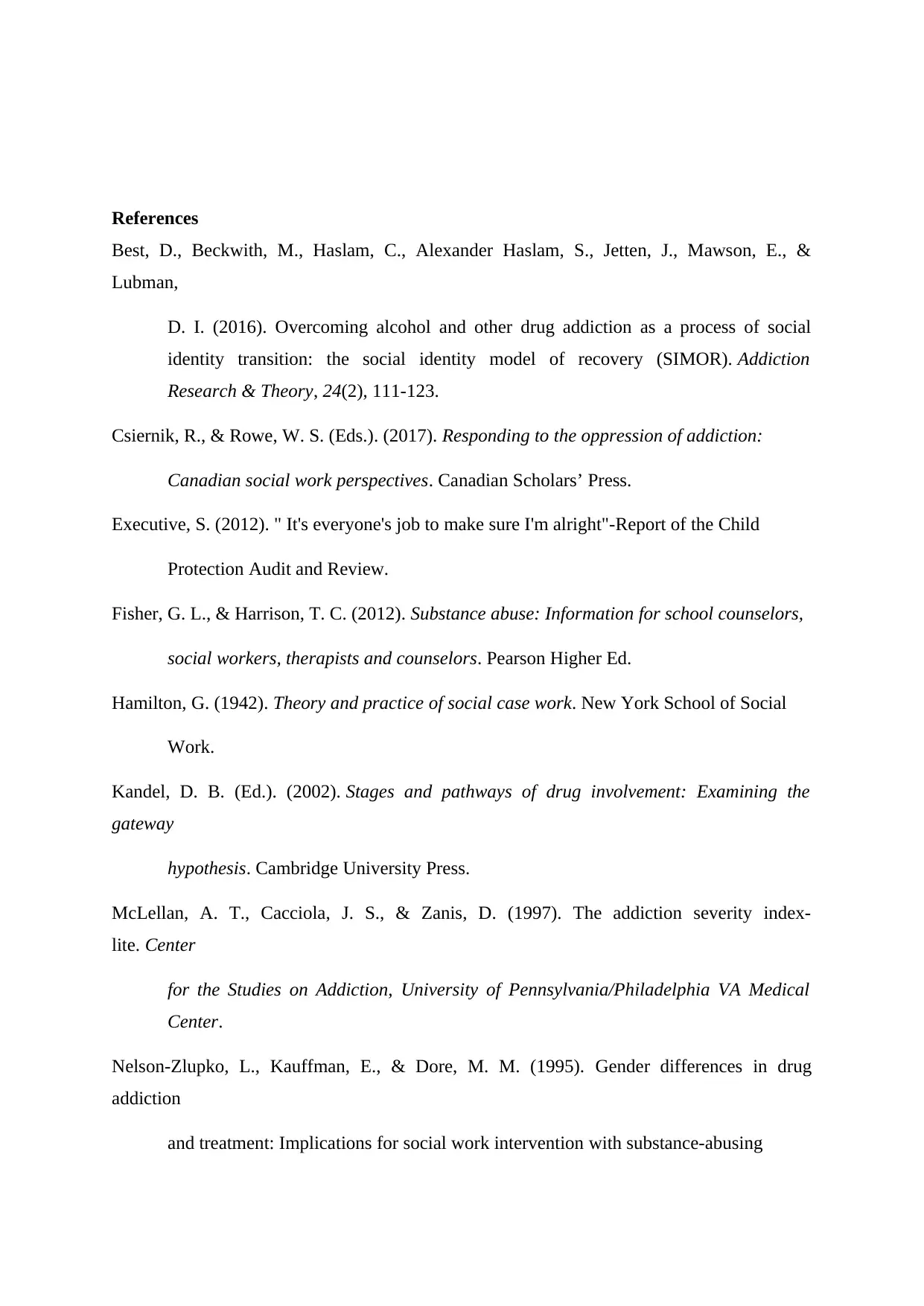
References
Best, D., Beckwith, M., Haslam, C., Alexander Haslam, S., Jetten, J., Mawson, E., &
Lubman,
D. I. (2016). Overcoming alcohol and other drug addiction as a process of social
identity transition: the social identity model of recovery (SIMOR). Addiction
Research & Theory, 24(2), 111-123.
Csiernik, R., & Rowe, W. S. (Eds.). (2017). Responding to the oppression of addiction:
Canadian social work perspectives. Canadian Scholars’ Press.
Executive, S. (2012). " It's everyone's job to make sure I'm alright"-Report of the Child
Protection Audit and Review.
Fisher, G. L., & Harrison, T. C. (2012). Substance abuse: Information for school counselors,
social workers, therapists and counselors. Pearson Higher Ed.
Hamilton, G. (1942). Theory and practice of social case work. New York School of Social
Work.
Kandel, D. B. (Ed.). (2002). Stages and pathways of drug involvement: Examining the
gateway
hypothesis. Cambridge University Press.
McLellan, A. T., Cacciola, J. S., & Zanis, D. (1997). The addiction severity index-
lite. Center
for the Studies on Addiction, University of Pennsylvania/Philadelphia VA Medical
Center.
Nelson-Zlupko, L., Kauffman, E., & Dore, M. M. (1995). Gender differences in drug
addiction
and treatment: Implications for social work intervention with substance-abusing
Best, D., Beckwith, M., Haslam, C., Alexander Haslam, S., Jetten, J., Mawson, E., &
Lubman,
D. I. (2016). Overcoming alcohol and other drug addiction as a process of social
identity transition: the social identity model of recovery (SIMOR). Addiction
Research & Theory, 24(2), 111-123.
Csiernik, R., & Rowe, W. S. (Eds.). (2017). Responding to the oppression of addiction:
Canadian social work perspectives. Canadian Scholars’ Press.
Executive, S. (2012). " It's everyone's job to make sure I'm alright"-Report of the Child
Protection Audit and Review.
Fisher, G. L., & Harrison, T. C. (2012). Substance abuse: Information for school counselors,
social workers, therapists and counselors. Pearson Higher Ed.
Hamilton, G. (1942). Theory and practice of social case work. New York School of Social
Work.
Kandel, D. B. (Ed.). (2002). Stages and pathways of drug involvement: Examining the
gateway
hypothesis. Cambridge University Press.
McLellan, A. T., Cacciola, J. S., & Zanis, D. (1997). The addiction severity index-
lite. Center
for the Studies on Addiction, University of Pennsylvania/Philadelphia VA Medical
Center.
Nelson-Zlupko, L., Kauffman, E., & Dore, M. M. (1995). Gender differences in drug
addiction
and treatment: Implications for social work intervention with substance-abusing
⊘ This is a preview!⊘
Do you want full access?
Subscribe today to unlock all pages.

Trusted by 1+ million students worldwide
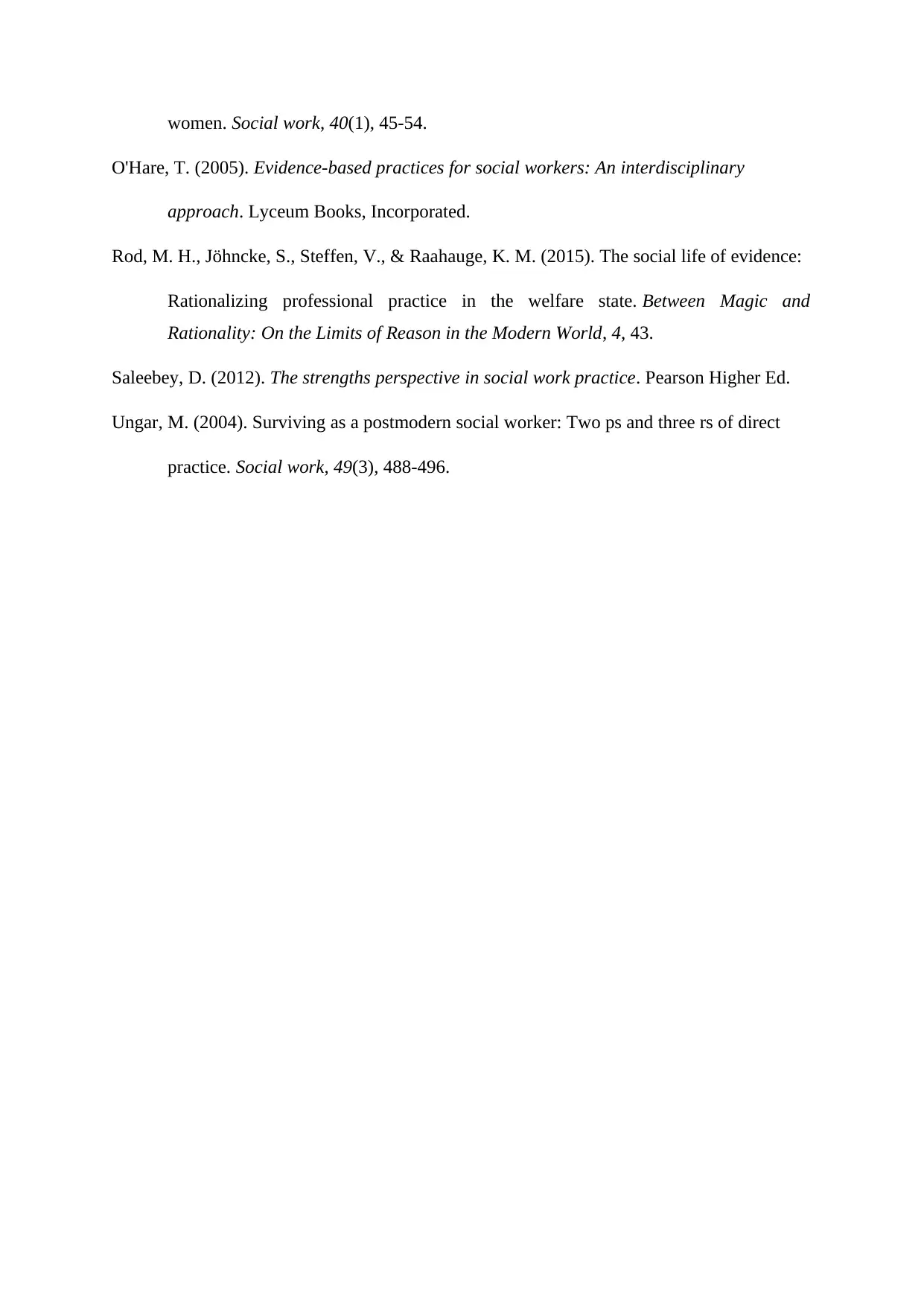
women. Social work, 40(1), 45-54.
O'Hare, T. (2005). Evidence-based practices for social workers: An interdisciplinary
approach. Lyceum Books, Incorporated.
Rod, M. H., Jöhncke, S., Steffen, V., & Raahauge, K. M. (2015). The social life of evidence:
Rationalizing professional practice in the welfare state. Between Magic and
Rationality: On the Limits of Reason in the Modern World, 4, 43.
Saleebey, D. (2012). The strengths perspective in social work practice. Pearson Higher Ed.
Ungar, M. (2004). Surviving as a postmodern social worker: Two ps and three rs of direct
practice. Social work, 49(3), 488-496.
O'Hare, T. (2005). Evidence-based practices for social workers: An interdisciplinary
approach. Lyceum Books, Incorporated.
Rod, M. H., Jöhncke, S., Steffen, V., & Raahauge, K. M. (2015). The social life of evidence:
Rationalizing professional practice in the welfare state. Between Magic and
Rationality: On the Limits of Reason in the Modern World, 4, 43.
Saleebey, D. (2012). The strengths perspective in social work practice. Pearson Higher Ed.
Ungar, M. (2004). Surviving as a postmodern social worker: Two ps and three rs of direct
practice. Social work, 49(3), 488-496.
1 out of 7
Related Documents
Your All-in-One AI-Powered Toolkit for Academic Success.
+13062052269
info@desklib.com
Available 24*7 on WhatsApp / Email
![[object Object]](/_next/static/media/star-bottom.7253800d.svg)
Unlock your academic potential
Copyright © 2020–2026 A2Z Services. All Rights Reserved. Developed and managed by ZUCOL.





